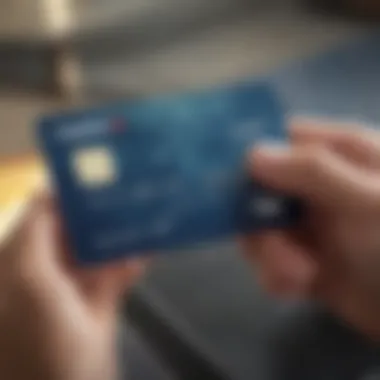Understanding Capital One Credit Card Expiration and Renewals


Intro
Capital One credit cards are commonplace tools for many consumers and investors. However, these cards have specific lifespans that require attention. When a card reaches its expiration date, it can lead to confusion or even disruptions in a user’s financial activities. This article will delve into the intricacies of Capital One credit card expiration and renewal processes. Understanding the implications surrounding this subject can empower consumers to make informed decisions, particularly regarding their credit scores and overall credit management.
Key Terms and Definitions
Understanding the terminology surrounding Capital One credit card expiration is crucial for both novice and seasoned investors. Here are some key terms that will be referenced throughout the article:
- Credit Card Expiration Date: This is the date on which a credit card is no longer valid for transactions. It is typically printed on the front of the card.
- Renewal: The process through which a credit card is replaced with a new one when it expires. Capital One usually initiates this process automatically.
- Credit Score: A numerical representation of a user's creditworthiness, which can be influenced by factors such as payment history and credit utilization.
- Credit History: A record of a user’s borrowing and repayment activities. It is essential for evaluating loan applications and obtaining new credit cards.
Explanation of Investment Terminology
Investment terminology can be daunting. However, knowing the right terms can simplify many financial decisions. For example, knowing the difference between credit utilization and credit inquiry can significantly affect your credit score. Understanding how each term impacts your personal finances is the first step in avoiding common pitfalls.
Commonly Used Financial Products
Capital One offers various financial products beyond credit cards. These include savings accounts, auto loans, and personal loans. Each product has unique features and benefits, which cater to a wide range of financial needs. Familiarizing yourself with these products can help in making smarter financial choices and understanding the broader landscape of personal finance.
The Expiration and Renewal Process
When a Capital One credit card approaches its expiration date, the user should prepare for renewal. Here’s how this process typically unfolds:
- Automatic Renewal Notification: Usually, Capital One sends a notice before the card expires. This is often done through email or traditional mail.
- Issuance of New Card: A new card is typically mailed to the user several weeks before the expiration of the current card.
- Activation Process: Once the new card arrives, the user must activate it, usually by calling a dedicated number or via the Capital One app.
- Proper Disposal of Old Card: After activating the new card, it is advisable to destroy the old card properly to prevent misuse.
It's essential to stay aware of your card's expiration date to avoid any disruption in your credit, which could affect your credit score.
Potential Impacts on Credit Score
The expiration of a Capital One credit card can have multiple impacts on your credit score. When a card expires, and a new one is issued, the credit utilization ratio may shift. If the new card has a different limit compared to the expiring one, it can either positively or negatively affect your score. Here are some critical points:
- Credit Utilization Ratio: This is the amount of credit you are using compared to your total available credit. Keeping this ratio low is crucial for maintaining a good credit score.
- New Credit Inquiry: The process of obtaining a new card may involve a hard inquiry on your credit report. This can temporarily decrease your score.
Usually, if managed effectively, the renewal of your card won’t have lasting negative effects. However, it’s worth monitoring your credit score closely, especially around the time of renewal.
Strategic Advice for Managing Credit Histories
Managing credit histories effectively is vital for financial health. Here are some strategies:
- Monitor Your Credit Report Regularly: Regular checks can help you catch errors or discuss concerns early.
- Use Credit Wisely: Pay off balances in full whenever possible. This practice can help keep your credit utilization low.
- Plan for Major Purchases: Be mindful of how new credit inquiries might affect your score before making significant purchases.
In summary, paying attention to the expiration and renewal of your Capital One credit card can be a proactive step in maintaining your financial stability. The more informed you are about these processes, the better equipped you will be to navigate your financial landscape.
Preamble to Credit Card Expiration
Understanding the concept of credit card expiration is essential for any user navigating the financial landscape, especially those holding a Capital One credit card. Knowing when your card expires, and what actions to take, can help avoid potential lapses in access to credit and ensure that your financial activities are uninterrupted.
Importance of Understanding Expiration Dates
Expiration dates on credit cards signify when a card is no longer valid for transactions. This might seem straightforward, but the implications can be significant. Users who fail to monitor these dates risk facing declined purchases and potential complications in managing billing for subscriptions or recurring transactions. Additionally, understanding these dates helps in planning for renewal, which ensures continued access to credit without interruption.


It is important to closely monitor your card’s expiration date as this activates a range of financial practices. Card issuers, such as Capital One, may issue a new card automatically when the current one nears its expiration. However, this process is not flawless; sometimes cards are not automatically renewed. Understanding the process helps to preemptively address any potential issues that may arise during this transition.
Overview of Capital One Credit Cards
Capital One is a prominent player in the credit card market, known for a variety of credit card offerings that cater to different financial needs. From rewards cards to those designed for building credit, Capital One’s products have become a staple for many consumers. Their cards often come with notable benefits that may appeal to both beginners and seasoned investors. These advantages can include cash back, travel rewards, and competitive interest rates.
Users of Capital One cards can expect a seamless online management system. This includes visibility into expiration dates and the ability to track renewals, making financial management more efficient. Understanding the portfolio of Capital One cards can assist users in choosing the best card for their needs, which may influence their overall credit management strategy.
"A clear understanding of credit card expiration is a proactive step towards effective financial management. Knowing how to respond as expiration dates approach can save consumers from unexpected complications."
Familiarity with Capital One's offerings and policies is advantageous, particularly in regard to card renewals. This knowledge equips users with the necessary tools to navigate any transitional phase smoothly, ensuring safe and efficient handling of finances.
Capital One Card Expiration Process
Understanding the Capital One card expiration process is crucial for cardholders. This section delves into the mechanics of card expiration, elaborating on the typical lifespan of these cards and how notifications are sent prior to expiration. By familiarizing yourself with these aspects, you can ensure that your credit management practices remain seamless, thus avoiding common pitfalls.
Typical Card Lifespan
Capital One credit cards typically have a lifespan of three to five years. This duration may vary based on several factors including the type of card and how actively it is used. For example, premium cards may have slightly different terms. Knowing the lifespan can help you plan finances and understand when to expect a renewal.
It is also important to monitor your own usage patterns. An inactive card may have a shorter lifespan than one consistently used. Maintaining regular activity can indicate to Capital One that the card remains valuable to you, potentially influencing renewal decisions.
Notification for Expiration
Capital One makes efforts to notify cardholders about impending expiration. Generally, you will receive a notification via email or a traditional mail at least 30 days before the card officially expires. These notifications are crucial as they provide you with ample time to take action.
However, not all customers might receive these communications simultaneously. It can depend on your account settings and preferences related to communication. Therefore, it is advisable to double-check the contact information linked to your account.
Here are some typical methods of receiving notifications:
- Email Alerts: You may receive a message in your registered email.
- Mobile App Notifications: If you use the Capital One app, alerts can arrive straight to your device.
- Physical Mail: A written notice may be sent as well, especially if you prefer to receive information this way.
Keeping an eye on these notifications ensures that you remain informed and ready for any necessary actions before your card expires.
By understanding the typical card lifespan and how notifications are disseminated, cardholders can better prepare for upcoming expirations and avoid disruption in their credit practices.
What Happens When a Capital One Card Expires?
When a Capital One credit card reaches its expiration date, several important changes occur that cardholders must understand. This part of the article focuses on the significant implications of an expired credit card on user experiences and financial management. Knowing these aspects is crucial for avoiding setbacks and ensuring seamless access to credit.
Card Deactivation and User Access
Upon the expiration of a Capital One card, the card will be deactivated. This means that any transaction that requires swiping or entering card details, such as in-store purchases or online checkouts, will be declined. Users will lose immediate access to the credit line associated with that card until they have a new one in hand.
It is essential for cardholders to keep track of their expiration dates. Capital One typically notifies customers of impending expirations, but knowing your card’s expiration date is a good practice. If a customer does not receive a new card by the time the current card expires, they may encounter disruptions in payments or transactions.
Access to other functions related to the card, such as checking balances or rewards, might remain available through the Capital One mobile app or website. However, without a valid card, many everyday transactions may become troublesome. Therefore, preparing for this transition becomes a vital part of credit card management.
Impact on Recurring Transactions
Recurring transactions are payments set up to occur automatically, typically for services like subscriptions or utilities. When a Capital One card expires, these recurring payments can be significantly impacted. If the card linked to these transactions is not renewed in time, payments may be declined.


This situation can lead to several undesirable outcomes:
- Service interruption: Services tied to recurring payments may pause or terminate when payments fail.
- Late fees: Missed payments often result in late fees, adding an unexpected expense.
- Impact on credit score: If a recurring payment is tied to a loan or housing-related account, failing to pay could damage a user’s credit score.
To prevent issues with recurring transactions, it is wise to monitor your accounts and update payment methods promptly upon receiving a new card. Verifying all linked services and adjusting them accordingly ensures that essential payments are not missed.
Monitoring financial obligations is key to maintaining healthy credit.”
To digest, knowing what happens when a Capital One card expires helps users anticipate challenges and manage their finances effectively. Being proactive in renewing cards and updating payment methods can mitigate any detrimental effects and contribute to a smooth financial journey.
Renewing an Expired Capital One Card
Renewing an expired Capital One card is crucial for maintaining seamless access to credit and managing personal finances effectively. It ensures continuous usage of credit for purchases, which is essential for both daily transactions and managing credit scores. When a card expires, it can lead to disruptions in automatic payments, affecting services that rely on these transactions.
Moreover, timely renewal helps in avoiding potential penalties associated with delayed payments or service interruptions. Understanding the steps involved in renewal can empower users to take proactive measures in their financial management, thus mitigating negative impacts and maximizing the benefits of their credit cards.
Steps to Renew Your Card
Renewing a Capital One card is straightforward. Follow these steps:
- Check Expiration Date: Always know when your card is set to expire. This is typically printed on the front of the card.
- Contact Customer Service: Reach out to Capital One through their official website or customer service number. You can often start the renewal process online or through the app, making it convenient.
- Confirm Account Information: Security is critical. Be ready to verify personal information like your name, address, and last four digits of your Social Security Number.
- Request Renewal: Clearly state you wish to renew your expired card. If there are any changes in the terms or conditions, they will inform you.
- Await Confirmation: You should receive confirmation of your renewal request, along with any pertinent details regarding your new card.
By following these steps, users ensure they keep control over their finances without unnecessary hiccups. It’s worth noting to also monitor your email for any notifications from Capital One regarding card status or additional steps.
Timeframe for Receiving a New Card
Once the renewal process is initiated, it generally takes a certain amount of time for the new Capital One card to arrive in the mail.
- Standard Processing Time: Typically, you can expect to receive your new card within 7 to 10 business days after the renewal request is confirmed. This timeframe can vary based on your location and any postal delays.
- Expedited Options: If needed, ask Capital One about expedited card delivery options. They may have express services available for urgent situations.
- Monitoring Arrival: Keep an eye on any tracking details provided by Capital One. This ensures you remain informed and prepared for when your new card will arrive.
By being aware of this timeframe, you can plan accordingly and prevent any lapse in access to credit, thereby managing your financial commitments more effectively.
Impact on Credit Score
Understanding the impact of Capital One credit card expiration on your credit score is crucial for any cardholder. Your credit score is a numeric representation of your creditworthiness, and several factors contribute to its calculation. Among these factors, credit utilization and the average age of open accounts play significant roles.
Credit utilization refers to the ratio of your current credit card balances to your total credit limits. Keeping this ratio low is favorable for your credit score. When a Capital One card expires, if not replaced promptly, it can reduce your available credit. This reduction might inadvertently raise your credit utilization ratio if you carry balances on other cards. It is wise to be mindful of this impact to maintain a healthy credit score.
Another element at play is the average age of your credit accounts. The length of your credit history affects your credit score calculation. An expired card that you have held for several years contributes positively to this history. When the card expires and is not renewed, it may lead to a shorter average account age. For those managing multiple lines of credit, it is important to understand how account closures and expirations can reflect on one’s credit report.
"A single expired credit card can affect credit utilization and average account age, which can ripple through your overall credit score."
In summary, being informed about how an expired Capital One card can impact your credit score allows you to strategize your next steps to mitigate potential negative outcomes.
Managing Credit History Post-Expiration
Managing credit history after the expiration of a Capital One credit card is an important endeavor that requires attention and strategy. It is essential for maintaining a favorable credit score and overall financial health. Understanding how to handle your credit history during this transition can yield significant benefits and prevent negative impacts on your future applications for credit.
Keeping Track of Your Credit Usage
After your Capital One card expires, keeping track of your credit usage becomes vital. This includes monitoring existing accounts and ensuring that your overall credit utilization ratio remains optimal. A high ratio can harm your credit score, so aim to keep it below 30%.


- Review Current Balances: Make it a priority to regularly check the balances of your open credit accounts, which can help you stay on top of your credit utilization.
- Understand the Impact of Expired Card: An expired card does not disappear from your report immediately. Its effect lingers, so keeping secure payment methods is crucial to avoid missed payments that could negatively affect your score.
- Use Credit Monitoring Tools: Utilizing tools like free credit score sites or apps can help track changes in your credit score in real-time.
These steps ensure that you remain aware of your financial status, allowing you to adjust your usage if necessary to retain a healthy credit score.
Evaluating New Credit Options
Once a Capital One card has expired, assessing new credit options is necessary for maintaining and rebuilding credit. Evaluating different offers not only helps you find better rates but also ensures that you make informed decisions.
- Research Available Credit Cards: Explore various credit cards that match your financial habits, consider cashback options, and annual fees.
- Understand Terms and Conditions: Be sure to read the fine print of any new credit agreement. This includes interest rates, potential fees, and rewards programs.
- Consider Special Offers: Some lenders provide introductory offers such as 0% APR for a limited time; these can be advantageous if used wisely.
Maintaining a proactive approach to credit options after an expired card can cushion potential negative credit scores and facilitate future credit applications.
"Regularly reassessing your credit strategy not only helps mitigate past mistakes but also provides new opportunities for financial growth."
Lessons Learned from Card Expiration
Understanding the lessons learned from card expiration is critical for anyone using a credit card, especially with Capital One. The expiration of a credit card often brings a mix of confusion and concern. Learning from the experience can help individuals navigate future transactions more effectively. This section will explore the importance of staying informed and how behavior change can impact financial transactions.
Importance of Staying Informed
Having knowledge about credit card expiration is crucial. Many people overlook this aspect, leading to problems when a card expires unexpectedly. Keeping track of the expiration date ensures that you can manage your finances without interruption.
Some key points to consider include:
- Notify Yourself: Set reminders a few months before your card expires. This proactive measure helps you anticipate renewal and avoids last-minute rushes.
- Understand Bank Policies: Different banks may follow varied procedures regarding card expiration. Familiarizing yourself with Capital One's practices is essential.
- Review Transactions: Analyze your recent transactions. Knowing what to expect in terms of recurring payments can lessen the stress of expiration.
Staying informed is not just about knowing when the card expires. It’s about understanding how it affects your entire financial landscape.
Behavior Change for Future Transactions
Learning from expired cards often prompts individuals to reconsider their transactional behaviors. By analyzing past actions, they can make informed decisions for the future. This reflection can lead to significant behavior adjustments, enhancing financial stability.
Actions that can improve handling credit transactions include:
- Regular Reviews: Regularly reviewing credit card usage can help you recognize patterns. Identify any subscriptions or bills linked to your card.
- Open Communication with Issuer: Establishing a reliable line of communication with Capital One can clarify any uncertainties. Knowing who to ask for assistance is invaluable.
- Diversify Payment Methods: Depending solely on one card may lead to issues when it expires. Having a backup or secondary card can provide peace of mind.
In summary, understanding lessons from card expiration is not just about reacting to the event. It involves a proactive approach towards managing your credit effectively. By staying informed and modifying your behaviors, you enhance your financial acumen, ensuring a smoother experience in the future.
Closure
In this article, we have examined a crucial aspect of personal finance that often goes overlooked: the expiration and renewal process of Capital One credit cards. Understanding how this mechanism works is not only important for maintaining smooth financial transactions but also pivotal in managing your credit score effectively.
Summarizing Key Insights
A few key points emerge when discussing Capital One card expiration:
- Expiration Timeline: Typically, Capital One credit cards have a lifespan of several years. It's beneficial to know when your card is due to expire to mitigate disruptions.
- Renewal Process: The steps for renewing an expired card are straightforward, often initiated automatically by the bank. Cardholders should verify their contact information to receive the new card promptly.
- Impact on Credit Score: Expired cards can detrimentally affect credit utilization, which is a significant factor in credit scoring. Monitoring your credit situation post-expiration is vital for maintaining a healthy credit profile.
Each of these elements contributes to a broader understanding of how to manage your financial health responsibly. Ignoring expiration dates can lead to unintentional financial pitfalls, while proactive management can safeguard your interests.
Final Thoughts on Credit Card Management
Effective credit card management encompasses more than just using your card. It requires vigilance regarding expiration dates and renewals. Consider these final thoughts:
- Stay Informed: Regularly check the expiration date printed on your card. Many banks, including Capital One, provide reminders as expiration approaches, but your own tracking effort is beneficial.
- Review Card Updates: If your card is replaced, familiarize yourself with any new features or changes to terms associated with your account.
- Evaluate Financial Habits: Use this experience as an opportunity to reflect on your spending habits and overall financial management strategies.
By being aware and proactive, you can prevent potential inconveniences and enhance your understanding of your credit cards. This conscientiousness not only helps in daily transactions but also plays a pivotal role in your long-term financial health.



